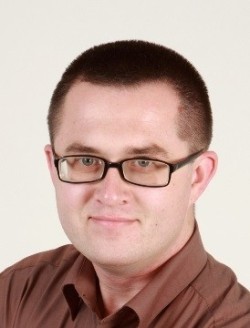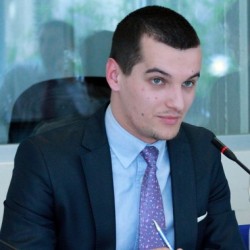Session 3: Propaganda and Strategic Communications: Experience of EU and Višegrad Countries
(in partnership with GLOBSEC with the support of the International Visegrad Fund)
Discussion Points:
- What are the key differences between propaganda and disinformation campaign in the modern world? What is considered “fair play” and what isn’t?
- Are we living in times of “information warfare”?
- Which are the actors being engaged in such activities today?
- How to counter propaganda and disinformation? Which tools are EU and NATO developing? What is civil society’s response?
Speakers:
Amb. Daniel Schaer‚ Ambassador of Estonia to Bosnia and Herzegovina, Macedonia, Montenegro and Serbia
Ruslan Deynychenko‚ Co-Founder and Executive Director, StopFake.org Ukraine
Jakub Janda‚ Deputy Director, European Values Think-Tank, Czech Republic
Moderator: Andrej Matišák‚ Deputy Head of the Foreign Desk, Daily Pravda, Slovakia
Background
For several years now, wider Europe has been faced with unprecedented misinformation campaigns and propaganda aimed at denting the unity of EU member states and projecting an image of inherent weakness and discord. The European Union (EU) and its External Action Service (EEAS) have recognized this as a threat going hand in hand with growing extremist and populist movements, exploiting such ideas all around Europe. NATO has used terms “propaganda” and “disinformation” to describe Russia’s activities in and beyond Ukraine. Finally, in its recent resolutions the European Parliament has expressed concern over Russia’s political propaganda. On the other hand, Russia uses the term “information warfare” to describe both cyber attacks and “mass psychological campaigns” intent on destabilizing governments; with its senior officials stating how they are simply responding to the challenge posed by Western countries.
Both the EU as well as NATO had to react to propaganda and misinformation by establishing their own structures that study this phenomenon, aiming to debunk some of the most obvious lies and misinformation as well as to come up with tactical and strategic tools how to react to this threat. Work of these international structures is supported by a growing number of NGOs and think tanks working in the area of strategic communication. This panel aims at pooling best experts and practitioners from EU, V4 and other countries, that are exposed to the coordinated propaganda and misinformation campaigns, in order to hear their experiences and discuss possibilities for cooperation with countries of the South East Europe – Serbia in particular.
—————————————————
Selected Readings
- Francisco de Borja Lasheras, Vessela Tcherneva and Fredrik Wesslau, March 2016, “Return to Instability: How Migration and Great Power Politics Threaten the Western Balkans”
- European Union External Action Service, November 2015, “Disinformation Review”
- European Parliament, November 2015, “At a glance: Understanding Propaganda and Disinformation
- GLOBSEC, August 2015, “Ukrainian crisis: the most frequent myths and lies”
Useful websites




